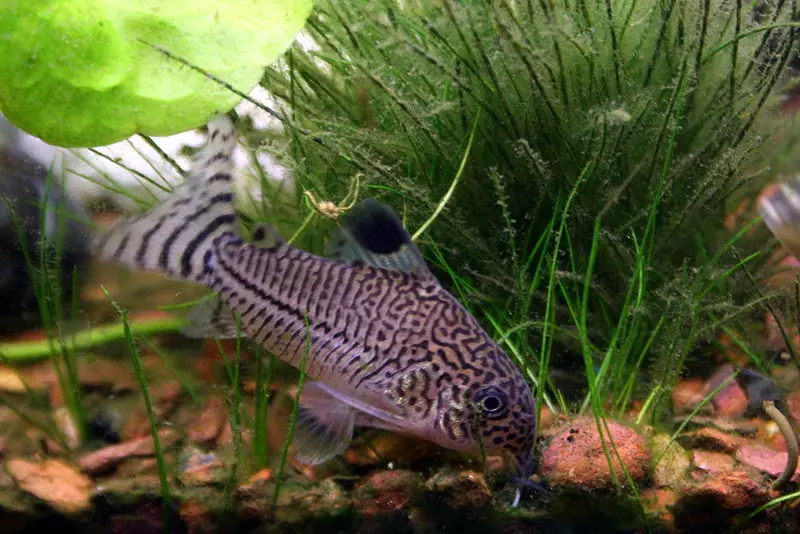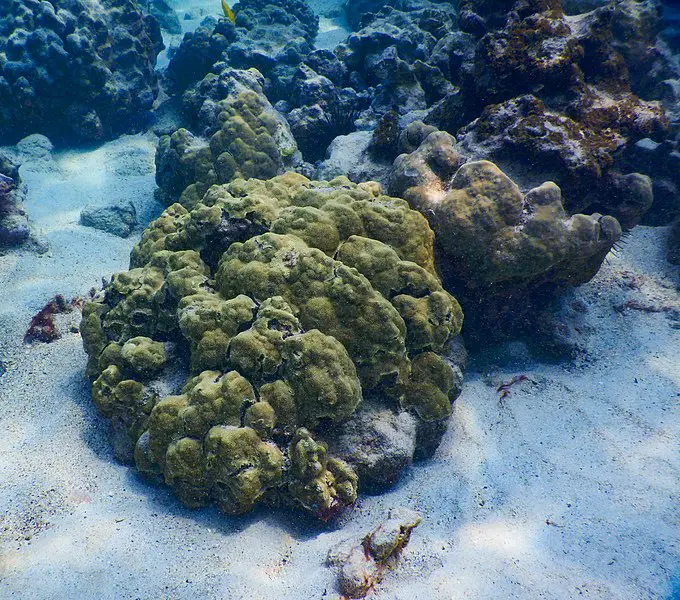When combining species in your aquarium, it’s vital to check the compatibility of the species you are considering adding to your tank to make sure they can peacefully coexist.
Cory catfish (also known as corydoras) are not usually compatible with cichlids, especially African cichlids. Most cichlids are aggressive or semi-aggressive in nature, and will readily attack the small, docile corydoras.
Read on to learn which species are suitable tank mates for cichlids and corydoras.
About Cory Catfish
These friendly, low-maintenance fish originate are fun to watch and clean detritus from your tank, contributing to a healthier aquarium community. They are curious and peaceful fish that differ from other catfish species due to their plates of bone-like material along their sides, which categorizes them as “armored catfish.”
Cory catfish range from 1 – 2.5 inches in length and thrive in any size aquariums. They are popular additions to freshwater aquariums and are ideal for beginner fish owners because of their ease of care.
Corydoras will easily share a tank with other small, friendly and non-aggressive aquatic species. They are shy and timid fish, so make sure to provide many hiding places like driftwood, rocks, and live plants for your cories.
About Cichlids
Cichlids are one of the most diverse families of freshwater fish, including more than 1,300 species of fish with new species being discovered every year. Cichlids include well-known fish such as angelfish, African cichlids, Jack Dempseys, discus fish, jewelfish, and more.
Cichlids prefer warm waters and lots of live plants and driftwood in their tanks, most species originating from Africa and South America.
African Cichlids
African cichlids are a cichlid subcategory that encompasses the varieties originating from several lakes in the African continent, including but not limited to Lake Tanganyika, Lake Malawi, and Lake Victoria. They can grow quite large – up to 12 inches long.
These cichlids are typically more aggressive that South American cichlids, and rarely share a tank with other fish other than their own species.
Can you put Cory Catfish with Cichlids?
Because cichlids generally have aggressive or semi-aggressive natures, they usually aren’t good tank mates for cory catfish. If you want to try getting a cichlid for your corydora’s tank, go with a dwarf cichlid, as they are smaller than regular cichlids and are less likely to become aggressive with your corydoras.
While there have been some reports about cichlids successfully sharing a tank with cory catfish, as a general rule, experts recommend avoiding mixing the species in the same tank.
Can Corydoras live with Mbunas?
No. Mbuna cichlids, which are a type of African cichlid, are aggressive and will kill your cory catfish.
What Fish can be in a Tank with African Cichlids?
While African cichlids are very aggressive and will readily attack any fish smaller than them, they can often coexist well with fish species of an equal or greater size.
The following fish species are generally safe to keep with African cichlids.
Plecos
Plecos, also known as Hypostomus plecostomus or suckermouth catfish, are large algae-eating fish that can grow as large or even larger as African cichlids. Like corydoras, plecos are armored catfish, and come in a variety of colorful patterns.
Red Tail Sharks
Red tail sharks and African cichlids are both aggressive in nature but will share a tank well as long as there is only one red tail shark in the tank. Otherwise, they will gang up and attack other fish.
Giant Danios
Larger than regular danios, giant danios grow on average of four inches in length, so they can share a tank with smaller African cichlids.
Rainbow Fish
Rainbow fish can defend themselves in an aquarium with African cichlids, and their colorful scales make for an eye-catching addition to your freshwater tank.
Synodontis Catfish
These catfish are native to the African Lake Tanganyika, which is one of the lakes many African cichlids come from. They are large bottom feeders that keep to themselves and won’t invade your cichlids’ territory.
Siamese Algae Eater
These sleek, silvery fish are bottom feeders that will help keep your tank clean. To keep them from getting bullied by the African cichlids, keep them in a school of at least five.
Leopard Bushfish
These beautiful fish have the added ability to camouflage themselves in their environment, making it easy for them to avoid being bullied by African cichlids.
Clown Loaches
This fish resembles something of a cross between a clown fish and an Oscar, with an orange and black striped body and long whiskers. They are active fish and need a lot of hiding places to thrive.
What Fish can be in a Tank with Cory Catfish?
Danios
These fish, more formally known as zebra danios, have flashy iridescent stripes down their sides that make for an eye-catching display in any aquarium. Since they are natural schooling fish, make sure to have a group of at least five.
Gouramis
Known for their large, colorful bodies, gouramis thrive in warm waters and need a lot of plants in their tank, as they feed on plant matter.
Tetras
These small, colorful fish are popular for their wide range of colors and ease of keeping in an aquarium. They do well with many species and need to be kept in schools of at least 10 to keep them happy.
Ivory Snails
This South American species of freshwater snail, with its creamy white shell and pinkish underside, can grow quite large – up to 3 inches in diameter.
Platies
These popular live-bearing fish are native to Mexico and Central America and are a great beginner fish due to the ease of their care. They come in a variety of beautiful colors and patterns.
Mollies
This popular aquarium species is friendly by nature and non-aggressive. They come in many different colors and tail shapes, including the well-known lyre-tail molly.
Ghost Shrimp
Ghost shrimp are great cleaners for your aquarium and will feed on the detritus in your substrate. Their name comes from their transparent bodies.
Hatchetfish
Named for their oddly shaped bodies, hatchetfish are peaceful and will coexist well with other non-aggressive fish in your aquarium.


